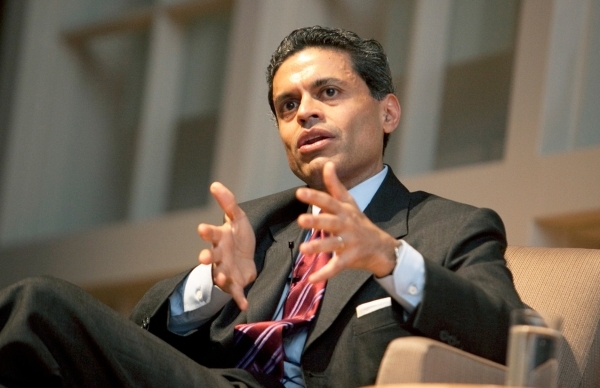Barrick’s legacy alive in lectures

Following a nine-month hiatus, UNLV’s Barrick Lecture Series is back. The first address under UNLV President Len Jessup’s watch was delivered Tuesday by writer and CNN host Fareed Zakaria.
Unlike former UNLV President David Ashley, who allowed the free lecture series to fade away after Marjorie Barrick’s death in 2007, Jessup seems to be gung ho about providing two or three lectures a year, much like former UNLV President Neal Smatresk did.
I’d like to take some small credit for pointing out repeatedly that if the woman left the money, UNLV should spend it as she wanted.
Barrick was no pussy cat. If she had been alive, the neglect of the series she started in 1980 wouldn’t have occurred. If you give a university $11.5 million, officials tend to listen. Until you die.
“In Defense of a Liberal Education” was the title of Zakaria’s speech, as well as his most recent book, and was prompted by a speech he gave in 2014 to Sarah Lawrence College, his wife’s alma mater.
Rest assured, in this polarized world of politics, he is not using the term “liberal education” politically, but as the Romans used it: “pertaining to free men.”
The journalist born and raised in India believes college students who major in liberal arts, such as English and history, are dwindling because of the ever-increasing focus on science and technology majors that can guarantee jobs.
In his book, he contends the central virtue of a liberal education is that it teaches you how to write, and writing makes you think. To continue his thought, a liberal arts education teaches students how to speak and teaches them how to learn.
He singled out two of the men he has interviewed about education: Steve Wynn and Mark Zuckerberg.
Casino developer Wynn told Zakaria his English literature degree from the University of Pennsylvania was “the core of his success.” History guided design while psychology motivated layout.
In his book, Zakaria described Facebook CEO Zuckerberg as “a classic liberal arts student who also happened to be passionately interested in computers. He studied ancient Greek intensively in high school and was a psychology major when he attended college. The crucial insights that made Facebook the giant it is today has as much to do with psychology as they do technology.”
Zakaria’s hourlong speech to a packed house at UNLV’s Ham Hall was surprisingly upbeat and optimistic about America, “despite the anxiety and fear that we are losing ground in the world.”
He gave example after example of America’s strength, past and present.
While today’s millennials are often described as selfish and self-centered, Zakaria described them as more idealistic, more willing to take risks and more earnest. “They have more potential than people realize.”
But the number of students majoring in English is dropping. In 1971, 7.6 percent of all bachelor’s degrees were in English language and literature. But by 2012, that figure dropped to 3 percent. Over the same time, the share of business degrees had soared from 13.7 percent to 20.5 percent.
How does UNLV compare? In 2014-15, UNLV conferred a total of 3,824 bachelor’s degrees. Of those, 83 were in English, or 2.2 percent, and 556 were in various disciplines offered by the Lee Business School, or 14.5 percent, according to UNLV spokesman Tony Allen.
Zakaria ended saying he didn’t want to discourage students from majoring in engineering and technology, and that students shouldn’t ignore the idea of deciding on majors based on potential earnings.
But his advice was direct: “Major in the things you love,” he said. “You’ll have many jobs and careers, and there’s a lot to life other than jobs.”
His education included a bachelor’s degree from Yale in history and a doctorate from Harvard in political science.
During a prespeech reception, Zakaria discussed what was on everyone’s mind as the results came in from the New Hampshire primary, where Donald Trump won on the GOP side and Bernie Sanders was the favorite of Democrats.
His vivid descriptions of the two parties made people laugh but were spot on.
The Democratic Party “usually wants to fall in love,” he said, citing Presidents Jimmy Carter, Bill Clinton and Barack Obama.
“The Republican Party generally falls in line,” he said, citing Presidents Ronald Reagan, George H.W. Bush and George W. Bush. “Today the Republican Party wants to fall in love, and there are a lot of options,” he laughed.
As for Trump, Zakaria said, “I don’t think he believes half of what he says.”
One of the joys of the Barrick lectures is that sometimes the speakers spend time with UNLV students. Zakaria spoke to UNLV journalism students. I like that. It was done quietly, without the media present. Zakaria told me they asked thoughtful questions, not how-can-I-get-a-job questions. I like that, too.
I was glad to see that Jessup has made sure, by appointing a committee to advise him, that Marjorie Barrick’s wishes are respected. He received cheers and woo-hoos when he announced that historian Doris Kearns Goodwin will be the next Barrick lecturer on April 25.
Marjorie Barrick, who had eclectic tastes, would definitely approve.
Jane Ann Morrison’s column runs Thursdays. Leave messages for her at 702-383-0275 or email jmorrison@reviewjournal.com. Find her on Twitter: @janeannmorrison